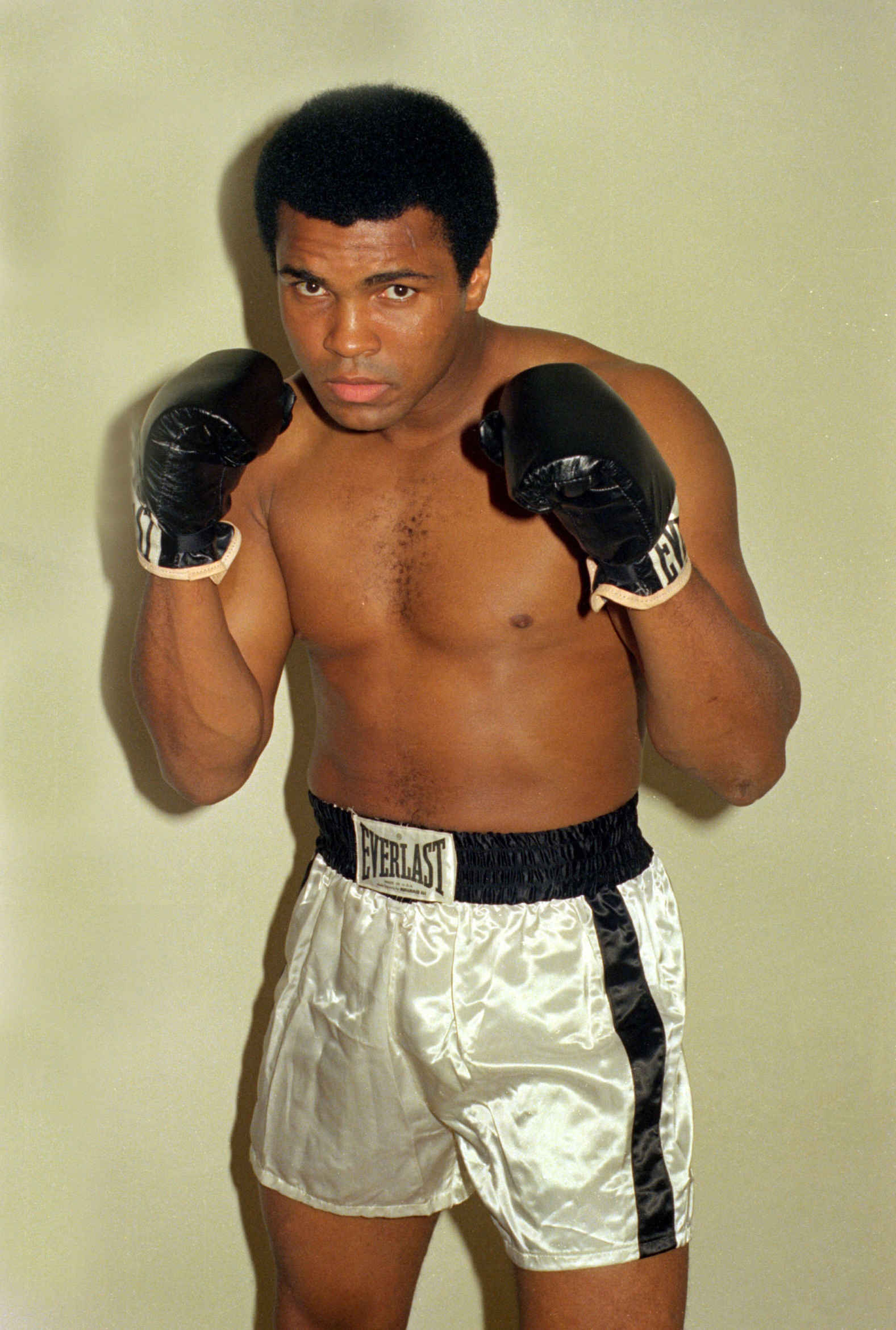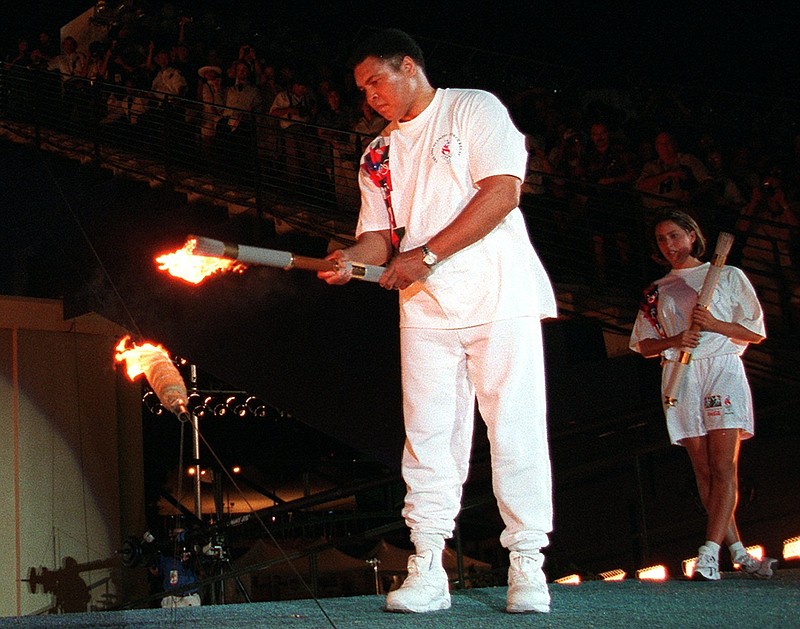Did Muhammad Ali's boxing career, in which his body was pummeled by some of the strongest punches in the world, cause his Parkinson's disease? Or did the constant workouts, year after year, keep him in tip-top shape and allow him to cope with Parkinson's to the age of 74?
The evidence is not clear that blows to the head cause Parkinson's, according to medical researchers, although they can certainly cause other brain damage. And Ali made his career with his ability to "float like a butterfly" and avoid opponents' punches until they tired themselves out.
Rock Steady Boxing
For more information on the Rock Steady Boxing programs, contact the North River YMCA, 423-877-3517; or Lori McCollum at Scenic City Rock Steady Boxing, 423-314-1309. Contact Will Hutchinson at 423-634-1578.
 FILE - This is an Oct. 9, 1974, file photo showing Muhammad Ali. Ali, the magnificent heavyweight champion whose fast fists and irrepressible personality transcended sports and captivated the world, has died according to a statement released by his family Friday, June 3, 2016. He was 74. (AP Photo/Ross D. Franklin, File)(AP Photo/FIle)
FILE - This is an Oct. 9, 1974, file photo showing Muhammad Ali. Ali, the magnificent heavyweight champion whose fast fists and irrepressible personality transcended sports and captivated the world, has died according to a statement released by his family Friday, June 3, 2016. He was 74. (AP Photo/Ross D. Franklin, File)(AP Photo/FIle)  FILE - In this Feb. 26, 2005, file photo, former heavyweight boxing champion Muhammad Ali, left, jokingly holds up two fingers behind the head of his daughter, Laila Ali, as they and his wife, Lonnie Ali, pose for cameras during a news conference before a tribute to him coinciding with Black History Month in Atlanta. Laila Ali told NBC's "Today" show on Monday, June 6, 2016 that her father is not suffering anymore. Muhammad Ali died Friday at 74 following a long battle with Parkinson's disease. (AP Photo/John Amis, File)
FILE - In this Feb. 26, 2005, file photo, former heavyweight boxing champion Muhammad Ali, left, jokingly holds up two fingers behind the head of his daughter, Laila Ali, as they and his wife, Lonnie Ali, pose for cameras during a news conference before a tribute to him coinciding with Black History Month in Atlanta. Laila Ali told NBC's "Today" show on Monday, June 6, 2016 that her father is not suffering anymore. Muhammad Ali died Friday at 74 following a long battle with Parkinson's disease. (AP Photo/John Amis, File) But what is clear, local experts say, is Ali's training is exactly what Parkinson's patients should do to minimize the impact of the disease.
In fact, a new program launching in Chattanooga this month uses boxing workouts as a way to help Parkinson's patients improve their hand-eye coordination and balance skills, and lessen the impact of their debilitating disease. In Rock Steady Boxing, a national program which the North River YMCA and Scenic City Rock Steady Boxing will both start offering later this month, patients smack a punching bag or spar with a coach in a boxing ring to improve their overall coordination and physical strength.
"The area of the brain affected by Parkinson's is the motor planning system," said Dr. Elizabeth Ferluga, a neurologist who specializes in movement disorders at Erlanger hospital. "If you are doing more movement, you are working on that part of the brain, re-enervating its circuits."
Patients also learn to compensate for their loss of certain brain pathways, Ferluga said.
"People who exercise do better in the long run," she said.
Few who saw Ali, already wracked with the disease, muster enough control to light the torch to kick off the 1996 Olympic games in Atlanta will forget his shaky body movements, leading to worldwide attention on Parkinson's.
Before Parkinson's, Ali "had very, very animated facial expressions," said Will Hutchinson, a speech specialist who runs the Parkinson's Disease Support Group at Siskin Hospital for Physical Rehabilitation. "One of the things we know about Parkinson's is that it leads to an overall decrease of movement in the facial area. You could really see that with Ali, it was a drastic change for him."
Ali's struggles to cope with the disease caught the public's attention.
"His involvement with Parkinson's disease was really transformational for the field. Before Ali, there wasn't that much known about Parkinson's disease" among the public, said Dr. Michael Okun, neurology chairman at the University of Florida and medical director of the National Parkinson Foundation, in an interview with The Associated Press. "People mistook it for Alzheimer's or ALS, and didn't realize that you could potentially live a long happy life with Parkinson's disease with the right cocktail of medicines, therapies and good expert care."
Ali later became an advocate for raising awareness, lending his name and wealth to Parkinson's research. In 1997, he helped establish a Phoenix neurological center that bears his name.
But whether boxing helped or hurt Ali is unclear. His constant training may have helped his body to cope with Parkinson's.
"He may have learned to compensate," Ferluga said, noting Ali had lived with the disease for many, many years.
Parkinson's is a degenerative disease, meaning it gets worse over time. Nerve cells in the brain malfunction or die, slowing production of a substance called dopamine, that appears to send signals to parts of the body associated with movement. As a result, Parkinson's patients may begin to slur their words, have problems with their balance and coordination, and have tremors in their arms, legs or face, according to the Parkinson's Disease Foundation.
About 1 million Americans have the disease and another 60,000 people are diagnosed each year, according to the foundation. Other celebrities with Parkinson's include actor Michael J. Fox, former U.S. Attorney General Janet Reno and singer Linda Ronstadt. But perhaps because the "fighter" analogy is so often linked to patients facing difficult illnesses, Ali's influence was unique.
Ali began showing signs of Parkinson's in his early 40s, shortly before he retired from boxing. Researchers say about 15 to 20 percent of Parkinson's patients report having a relative with the disease, but environmental factors seem to be linked to the disease, as well.
There is currently no cure, although treatment with drugs such as levodopa has offered some relief from the symptoms of the disease.
Recently, researchers have also realized that a regular program of exercise seems to help Parkinson's patients gain better control of their bodies.
Besides the Rock Steady Boxing program, the Y offers Parkinson's patients classes in spinning on stationary bicycles that boost coordination, strength and endurance.
"They are seeing less leg cramps, their gait is a little better, their balance is stronger, and over time, they get stronger," said Megan Vermeer, director of the healthy living program for the North Shore Y.
One effect of Parkinson's is that patients tend to lower the volume of their voices, although many are not aware of it. So Siskin's offers classes to help patients raise their voices.
"The focus is to teach their brain to take bigger steps, to have larger animated movements," said Hutchinson. "We are retraining their brain to produce a louder volume."
Contact staff writer Steve Johnson at 423-757-6673, sjohnson@timesfreepress.com, on Twitter @stevejohnsonTFP, and on Facebook, www.face book.com/noogahealth.
